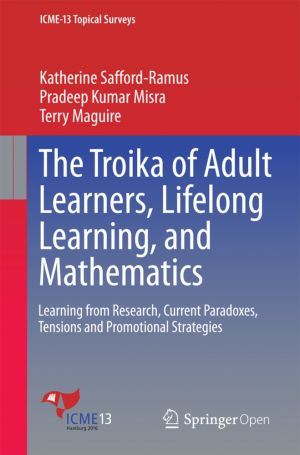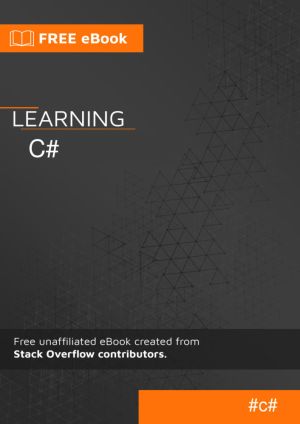Learning C#
by Stack Overflow Community
DescriptionTable of ContentsDetailsHashtagsReport an issue 






Book Description
C# is a general-purpose, modern and object-oriented programming language pronounced as "C sharp". It is an unofficial and free C# ebook created for educational purposes. All the content is extracted from Stack Overflow Documentation, which is written by many hardworking individuals at Stack Overflow.This open book is licensed under a Creative Commons License (CC BY-SA). You can download Learning C# ebook for free in PDF format (6.9 MB).
Table of Contents
Chapter 1
Getting started with C# Language
Chapter 2
.NET Compiler Platform (Roslyn)
Chapter 3
Access Modifiers
Chapter 4
Access network shared folder with username and password
Chapter 5
Accessing Databases
Chapter 6
Action Filters
Chapter 7
Aliases of built-in types
Chapter 8
An overview of c# collections
Chapter 9
Anonymous types
Chapter 10
Arrays
Chapter 11
ASP.NET Identity
Chapter 12
AssemblyInfo.cs Examples
Chapter 13
Async/await, Backgroundworker, Task and Thread Examples
Chapter 14
Async-Await
Chapter 15
Asynchronous Socket
Chapter 16
Attributes
Chapter 17
BackgroundWorker
Chapter 18
BigInteger
Chapter 19
Binary Serialization
Chapter 20
BindingList
Chapter 21
Built-in Types
Chapter 22
C# 3.0 Features
Chapter 23
C# 4.0 Features
Chapter 24
C# 5.0 Features
Chapter 25
C# 6.0 Features
Chapter 26
C# 7.0 Features
Chapter 27
C# Authentication handler
Chapter 28
C# Script
Chapter 29
Caching
Chapter 30
Casting
Chapter 31
Checked and Unchecked
Chapter 32
CLSCompliantAttribute
Chapter 33
Code Contracts
Chapter 34
Code Contracts and Assertions
Chapter 35
Collection Initializers
Chapter 36
Comments and regions
Chapter 37
Common String Operations
Chapter 38
Conditional Statements
Chapter 39
Constructors and Finalizers
Chapter 40
Creating a Console Application using a Plain-Text Editor and the C# Compiler (csc.exe)
Chapter 41
Creating Own MessageBox in Windows Form Application
Chapter 42
Creational Design Patterns
Chapter 43
Cryptography (System.Security.Cryptography)
Chapter 44
Data Annotation
Chapter 45
DateTime Methods
Chapter 46
Delegates
Chapter 47
Dependency Injection
Chapter 48
Diagnostics
Chapter 49
Dynamic type
Chapter 50
Enum
Chapter 51
Equality Operator
Chapter 52
Equals and GetHashCode
Chapter 53
Events
Chapter 54
Exception Handling
Chapter 55
Expression Trees
Chapter 56
Extension Methods
Chapter 57
File and Stream I/O
Chapter 58
FileSystemWatcher
Chapter 59
Func delegates
Chapter 60
Function with multiple return values
Chapter 61
Functional Programming
Chapter 62
Garbage Collector in .Net
Chapter 63
Generating Random Numbers in C#
Chapter 64
Generic Lambda Query Builder
Chapter 65
Generics
Chapter 66
Getting Started: Json with C#
Chapter 67
Guid
Chapter 68
Handling FormatException when converting string to other types
Chapter 69
Hash Functions
Chapter 70
How to use C# Structs to create a Union type (Similar to C Unions)
Chapter 71
ICloneable
Chapter 72
IComparable
Chapter 73
IDisposable interface
Chapter 74
IEnumerable
Chapter 75
ILGenerator
Chapter 76
Immutability
Chapter 77
Implementing Decorator Design Pattern
Chapter 78
Implementing Flyweight Design Pattern
Chapter 79
Import Google Contacts
Chapter 80
Including Font Resources
Chapter 81
Indexer
Chapter 82
Inheritance
Chapter 83
Initializing Properties
Chapter 84
INotifyPropertyChanged interface
Chapter 85
Interfaces
Chapter 86
Interoperability
Chapter 87
IQueryable interface
Chapter 88
Iterators
Chapter 89
Keywords
Chapter 90
Lambda expressions
Chapter 91
Lambda Expressions
Chapter 92
LINQ Queries
Chapter 93
Linq to Objects
Chapter 94
LINQ to XML
Chapter 95
Literals
Chapter 96
Lock Statement
Chapter 97
Looping
Chapter 98
Making a variable thread safe
Chapter 99
Methods
Chapter 100
Microsoft.Exchange.WebServices
Chapter 101
Named and Optional Arguments
Chapter 102
Named Arguments
Chapter 103
nameof Operator
Chapter 104
Naming Conventions
Chapter 105
Networking
Chapter 106
Nullable types
Chapter 107
Null-Coalescing Operator
Chapter 108
Null-conditional Operators
Chapter 109
NullReferenceException
Chapter 110
O(n) Algorithm for circular rotation of an array
Chapter 111
Object initializers
Chapter 112
Object Oriented Programming In C#
Chapter 113
ObservableCollection
Chapter 114
Operators
Chapter 115
Overflow
Chapter 116
Overload Resolution
Chapter 117
Parallel LINQ (PLINQ)
Chapter 118
Partial class and methods
Chapter 119
Performing HTTP requests
Chapter 120
Pointers
Chapter 121
Pointers & Unsafe Code
Chapter 122
Polymorphism
Chapter 123
Preprocessor directives
Chapter 124
Properties
Chapter 125
Reactive Extensions (Rx)
Chapter 126
Read & Understand Stacktraces
Chapter 127
Reading and writing .zip files
Chapter 128
Recursion
Chapter 129
Reflection
Chapter 130
Regex Parsing
Chapter 131
Runtime Compile
Chapter 132
Singleton Implementation
Chapter 133
Static Classes
Chapter 134
Stopwatches
Chapter 135
Stream
Chapter 136
String Concatenate
Chapter 137
String Escape Sequences
Chapter 138
String Interpolation
Chapter 139
String Manipulation
Chapter 140
String.Format
Chapter 141
StringBuilder
Chapter 142
Structs
Chapter 143
Structural Design Patterns
Chapter 144
Synchronization Context in Async-Await
Chapter 145
System.DirectoryServices.Protocols.LdapConnection
Chapter 146
System.Management.Automation
Chapter 147
T4 Code Generation
Chapter 148
Task Parallel Library
Chapter 149
Task Parallel Library (TPL) Dataflow Constructs
Chapter 150
Threading
Chapter 151
Timers
Chapter 152
Tuples
Chapter 153
Type Conversion
Chapter 154
Unsafe Code in .NET
Chapter 155
Using Directive
Chapter 156
Using json.net
Chapter 157
Using SQLite in C#
Chapter 158
Using Statement
Chapter 159
Value type vs Reference type
Chapter 160
Verbatim Strings
Chapter 161
Windows Communication Foundation
Chapter 162
XDocument and the System.Xml.Linq namespace
Chapter 163
XML Documentation Comments
Chapter 164
XmlDocument and the System.Xml namespace
Chapter 165
Yield Keyword
Book Details
Title
Learning C#
Subject
Computer Science
Publisher
RIP Tutorial
Published
2019
Pages
1008
Edition
1
Language
English
PDF Size
6.9 MB
License

Related Books

This book presents a synopsis of six emerging themes in adult mathematics/numeracy and a critical discussion of recent developments in terms of policies, provisions, and the emerging challenges, paradoxes and tensions. It also offers an extensive review of the literature adult mathematics education. Why do adults want to learn mathematics? Did they...

This book summarizes the vast amount of research related to teaching and learning probability that has been conducted for more than 50 years in a variety of disciplines. It begins with a synthesis of the most important probability interpretations throughout history: intuitive, classical, frequentist, subjective, logical propensity and axiomatic vie...

It argues that the main purpose of educational research is to improve student learning, and that international comparative studies are no exception....

This book provides a systematic overview of experiences with Inquiry-Based Learning (IBL) and undergraduate research (UR) in German universities, covering both research universities (Universitäten) and universities of applied sciences (Fachhochschulen). Divided into three parts, the book starts with the principles and common practices of IBL/UR at...

This book deals with the relevance of recognition and validation of non-formal and informal learning in education and training, the workplace and society. In an increasing number of countries, it is at the top of the policy and research agenda ranking among the possible ways to redress the glaring lack of relevant academic and vocational qualificat...

This book provides a practical philosophy for promoting students' sophisticated thinking from Early Childhood to PhD in ways that explicitly interconnect across the years of education. It will help teachers, academics and the broader learning and teaching community to understand and implement these connections by introducing a conceptual frame...

